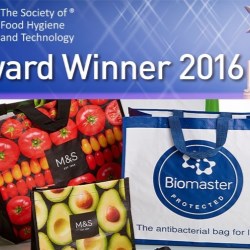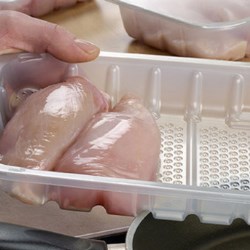Public
Addmaster (UK) Ltd Locations
Addmaster (UK) Ltd News
Addmaster (UK) Ltd Products
Addmaster (UK) Ltd Videos
If this is your company, CONTACT US to activate Packbase™ software to build your portal.


Fifteen months on from the 5p ‘Bag Tax’, almost three-quarters of the UK’s shoppers say they would pay a premium for an antimicrobial ‘bag for life’, of the type newly launched by Morrison's (pictured above) according to an independent survey.
Since the charge was introduced in October 2015, two thirds of people (65%) no longer buy single-use carrier bags when doing their shopping at the supermarkets, but they are putting their health at risk by re-using their old bags to carry more items than just food.
Amongst the most unusual things people admit putting in their shopping bag include a baby seagull, soiled nappies, tropical fish, the contents from a vacuum cleaner and ‘something illegal’.
The consumer survey shows that nearly three quarters (73%) never clean their reusable shopping bag after using it to carry food, and a third of us don’t bother sanitising our hands after shopping.
Many people are unaware that re-usable bags can be a refuge for all kinds of bacteria. Campylobacter, the biggest cause of food poisoning in the UK, can last for up to 8 weeks on the lining of a reusable shopping bag. Around half of people surveyed have never heard of Campylobacter.
9 out of 10 people do not know that you can buy a high street ‘Bag for Life’ containing technology that will reduce the risk of cross-contamination from harmful bacteria, but 93% of shoppers said they would consider using one, and 71% said they would be happy to pay more for one.
In summary, the key findings are:
- 65% of shoppers no longer buy single use bags when shopping at the supermarket. Only 23% buy one or two bags when visiting the supermarket.
- 51% reuse a shopping bag more than 11 times. The average number of times is eight.
- 34% would never think of sanitising their hands after shopping.
- Nearly three quarters (73%) do not clean their reusable shopping bag after using it.
- Nearly two thirds of people (65%) do not use separate bags for different food items. However for those that did use different bags it was for meat and frozen goods.
- Over three quarters (77%) of people surveyed use reusable shopping bags for more than just a food shop.
- The top four things people use reusable shopping bags for are rubbish (39%), shoes (38%), toiletries (38%) and packed lunch (34%).
- Half of people would never reuse a bag that had previously carried fresh beef, fresh chicken, pre-cooked meat, fresh lamb or fresh pork.
- 42% of people said they would reuse a bag that carried pre-cooked meat. Across the board around a third of people would reuse a bag that had carried fresh meat (34%).
- Over half of people surveyed (52%) did not know what Campylobacter is and 48% have never heard it mentioned.
- 93% of people would use or consider using a bag with antimicrobial properties, and 71% said they would be happy to more for one.
- Nearly three quarters (71%) would pay or consider paying for an antimicrobial bag.
When asked, “what’s the most unusual item you’ve put in a reusable shopping bag", among the answers were:
- The stuffed head of a fox
- A dead rabbit
- Soiled cat litter
- Prosthetic limbs
- A jar of tadpoles
- A turtle
- Dirty wellies
- Guinea pig bedding
- A bingo machine
- False teeth
- A sick pet
- A bong
- Garden weeds
- Road-kill
- Feet (the bag is used is an over-shoe in a muddy field)
Morrison's antibacterial PP woven bags are manufactured by solentgroup.co.uk. The survey was conducted by OnePoll and commissioned by Addmaster (UK) Ltd.















